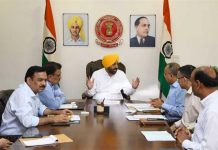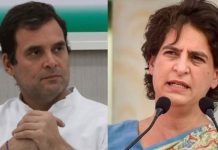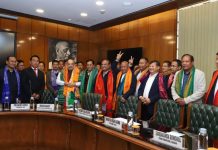SIMI says the government is right in saying it believes that human life should be governed on the basis of the Quran and that it wants to propagate Islam. (Its ex-leaders don’t say so openly, but certainly as Islamists they entertained notional ideas of an overarching Islamic order across nations and lands.) But SIMI’s ex-leaders deny every other claim of the government, especially that they are terrorists and want to break up India. According to them, theirs was a pious organisation that wanted to instil the best Islamic values in students. It was a fusion of purist Islamic religious values gained in madarsas as a guiding principle of life, with the secular learning of engineering, medicine and accounting.
BUT, AGAIN, no accurate background can be wrenched even from SIMI’s recent leaders on the group’s core activities of 30 years ago when it had barely launched, or in the years immediately after. Such is the ferocity of State persecution of SIMI that everyone, save a few, ever connected with SIMI are loath to articulate their experiences and highlight the organisation’s changing character over the years.
What is true though is that SIMI has in a sense contextualised for the Indian Muslims the key milestones in the history of independent India as they see it. Ask an Indian Muslim his list of key events since 1947 and chances are that the destruction of Ayodhya’s Babri Masjid by Hindu zealots in December 1992 would rank among the top three. The grisly killings of about 2,000 Muslims in Gujarat in February- March 2002 would certainly be another. The Shah Bano judgement would be the third.
The sizzle of a booming economy has seen India’s middle classes enjoying their new riches shrug off these epochal events and move ahead. For them, Babri Masjid is a relic and a nonissue, politically and socially. Not so for SIMI and its thousands of adherents across India. Says Yasin Patel, a SIMI member from 1985-97: “The demolition of the Babri Masjid was the murder of democracy. SIMI took notice of it.”
Conversations with a cross-section of Muslims across some nine cities give the impression that SIMI’s biggest attraction was that it
organised a voice for those Muslims who felt disheartened at being at the receiving end of decades of communal violence, and at the lack of political and economic opportunities for the Muslim community. Most importantly, SIMI rejected the pervasion of hopelessness and defensiveness among Muslims and said Muslims must fight for their rights within the framework of Quranic teachings. This certainly explains the group’s increasing pull among the Muslim youth.
“SIMI gave scholarships to bright and needy students,” said Abdul Razik of Kottayam, Kerala, a former SIMI activist. SIMI also launched ‘summer camps’ for middle class Muslim children studying in ‘secular’ schools so they could be given crash courses in Islamic teachings. Every day a new topic from the Quran was discussed. The 12-day workshop also had quizzes around holy teachings. SIMI also involved itself in relief work, such as in Gujarat when the earthquake struck the Kutch region on January 26, 2002.
With so many college students under its wings, it was natural that SIMI would take to publishing on current events in a major way. For years before it was banned, SIMI ran weeklies in Hindi, Urdu, English, Malayalam and Tamil among other languages across India. It had fulltime editorial staff from among its members, who daily scanned the mainstream media and picked up content from them. Such content, as well as original content in SIMI publications, were always highly political — and analysed in the overall context of the Quran. It was constantly pushing the envelope, such as demanding a plebiscite be held in Jammu and Kashmir to determine what Muslims want in that state.
One feature of SIMI was organising large conferences. SIMI’s ex-leaders are eager to point out that these were secular events, at least until 1992. Razik recalls that more than 700 people had attended one of its seminars, including several non-Muslims, one of them a professor of history at a nearby town college. In the early ’90s SIMI called a seminar on “Communism and Islam” at the Aligarh Muslim University. “We called people from both sides,” says Patel. Once in Ahmedabad, VHP demanded a ban on lamb slaughter when the Muslim festival of Bakr-Id and Mahavir Jayanti fell on the same day. SIMI called a symposium “Hindu Dharma and Non- Vegetarianism” and invited members of the Jain community. (The police had filed FIRs against the organisers.) When the Jamaat-e-Islami was banned after the demolition of the Babri Masjid in 1992, SIMI called a conference to protest it. In 1994, SIMI called a Muslim-Dalit conference against the caste system in Hinduism. SIMI’s leaders would travel regularly to smaller towns and cities and hold public meetings and discuss local issues of the Muslims concerning everyday living. As a bonus, they would explain key national and global events affecting Muslims.
On an ordinary day, SIMI activists would get together, pick a page of the Quran, and discuss its significance among them. At the time of the ban, SIMI was spread across 16 zones in Uttar Pradesh, Maharashtra, Kerala, Tamil Nadu, Madhya Pradesh, Gujarat, Rajasthan and Andhra Pradesh, among others. Each zone was further subdivided into sub-zones, units and ‘circles’. The pyramid structure worked well and had its own version of democracy. The bottom rung elected a leader from among itself through consensus. The member who was the subject of discussion would politely leave the room, so others could talk freely about him. Leaders so elected would meet and similarly elect leaders for one level up, and so forth. A member retired from SIMI after turning 30. Leaders were elected for a maximum of a two-year term. The president would appoint other office-bearers.
SIMI ex-leaders say they never took international money. Contributions were turned down from members if they migrated overseas. Ordinary members weren’t paid anything, but officebearers received meagre stipends — Falahi’s at the time of the ban was Rs 3,000 a month.
Surprisingly, almost everyone TEHELKA spoke with stressed that free speech was not only tolerated internally in SIMI but vigorously championed and zealously guarded by the members, lest the outfit turn autocratic.
“What distinguished SIMI from other Muslim organisations was that while the others had a limited vision, SIMI traversed the whole universe of local, national and international issues,” ex-SIMI activist Muqeemuddin Yasir told TEHELKA in Hyderabad, his face aglow with obvious pride. “It never failed to oppose the oppression of Muslims.” A month after the interview, Yasir was arrested by the Hyderabad police. Arrests and more arrests, that’s about all that’s been happening with SIMI over the last seven years. •












